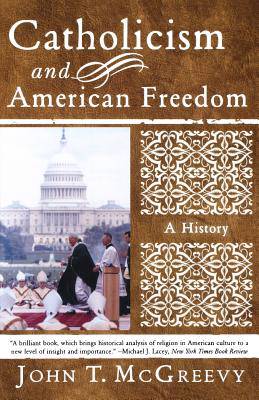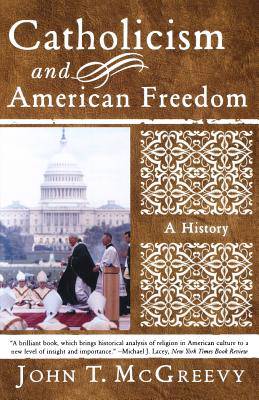
- Afhalen na 1 uur in een winkel met voorraad
- Gratis thuislevering in België vanaf € 30
- Ruim aanbod met 7 miljoen producten
- Afhalen na 1 uur in een winkel met voorraad
- Gratis thuislevering in België vanaf € 30
- Ruim aanbod met 7 miljoen producten
Zoeken
Omschrijving
For two centuries, Catholicism has played a profound and largely unexamined role in America's political and intellectual life. Emphasizing the communal over the individual, protections for workers and the poor over market freedoms, and faith in eternal verities over pragmatic compromises, the Catholic worldview has been a constant foil to liberalism. "Catholicism and American Freedom" is a groundbreaking tale of strange bedfellows and bitter conflicts over issues such as slavery, public education, economic reform, the movies, contraception, and abortion. It is an international story, as both liberals and conservatives were influenced by ideas and events abroad, from the 1848 revolutions to the rise of Fascism and the Spanish Civil War in the 1930s, to papal encyclicals and the Second Vatican Council in the 1960s; and by the people, from scholarly Jesuits to working class Catholics, who immigrated from Europe and Latin America. McGreevy reveals how the individualist, and often vehemently anti-Catholic, inclinations of Protestant intellectuals shaped the debates over slavery and how Catholics, although they were the first to acknowledge the moral equality of black people and disavowed segregation of churches, even in the South, still had difficulty arguing against the hierarchy and tradition represented by slavery. He sheds light on the unsung heroes of American history like Orestes Browson, editor of "Brownson's Quarterly Review," who suffered the disdain of abolitionists for being a Catholic, and the antagonism of conservative Catholics for being an abolitionist; and later heroes like Jacques Maritain and John Courtney Murray, who fought to modernize the Church, increased attention to human rights, and urged the Church "to adapt herself vitally . . . to what is valid in American democratic development." Putting recent scandals in the Church and the media's response in a much larger context, this stimulating history is a model of nuanced scholarship and provocative reading."
Specificaties
Betrokkenen
- Auteur(s):
- Uitgeverij:
Inhoud
- Aantal bladzijden:
- 432
- Taal:
- Engels
Eigenschappen
- Productcode (EAN):
- 9780393326086
- Verschijningsdatum:
- 1/09/2004
- Uitvoering:
- Paperback
- Formaat:
- Trade paperback (VS)
- Afmetingen:
- 137 mm x 211 mm
- Gewicht:
- 498 g

Alleen bij Standaard Boekhandel
+ 88 punten op je klantenkaart van Standaard Boekhandel
Beoordelingen
We publiceren alleen reviews die voldoen aan de voorwaarden voor reviews. Bekijk onze voorwaarden voor reviews.











